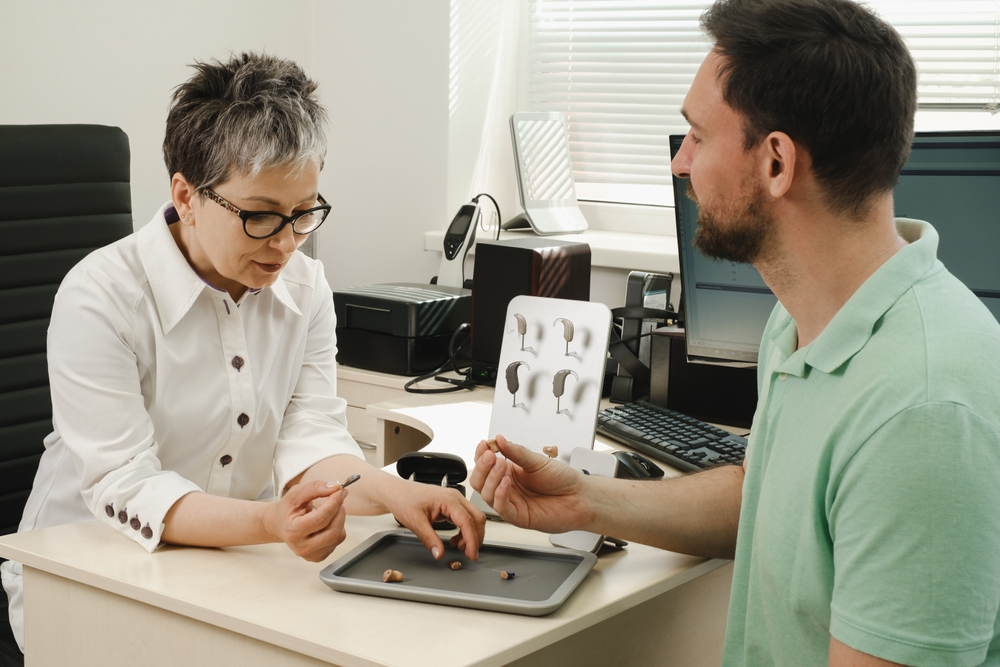Does someone you know do this? Perhaps he needs a hearing aid.
Football games with Ted are the worst. He has the volume turned up so high the walls rattle – and you certainly can’t pay attention to the game. All you notice is the roar of the crowd pounding against your body, punctuated by the ear-shattering staccato of the announcer’s play-by-play calls.
It’s not fun. But for Ted, the volume is normal. He needs the TV to be incredibly loud so he can hear it, which makes it pretty clear he needs a hearing aid. You’re just not sure how to tell him that. It should be a simple conversation, but he seems overly sensitive about the topic.
The following are some tips that could help.
Suggest a simple hearing screening
Ted needs to learn more about his hearing from a hearing specialist. He might not believe other people when they tell him he needs a hearing aid. If that’s the case, the trick will be getting Ted (or anyone like him) to see a hearing specialist.
You may be able to do that by using one of the following tactics:
- Emphasize that he’ll only be undergoing a simple screening. In the vast majority of cases, hearing screenings are quick and easy. Ted will get his results on an audiogram, which will break down his hearing by frequency. (Your hearing specialist will explain what the results mean.)
- Suggest the two of you go together for back-to-back screenings. This is a helpful way to broach a new medical situation. It’s possible you’ll learn you’ve experienced some hearing loss, as well (it may depend on how long you’ve been exposed to a high-volume television).
By focusing on the screening instead of hearing aids, you let the hearing specialist do the diagnosing – and you may be able to avoid a defensive reaction by Ted.
Discuss hearing loss behaviors
Hearing loss happens slowly – often progressing so slowly it’s unnoticeable. When this happens, you may pick up certain behaviors without realizing it. By focusing your discussion on those behaviors, you can subtly (or not so subtly) hint that Ted (or someone like him) needs a hearing aid.
Try something like the following:
- Mention that you’ve noticed how often you’re “translating” for him. It may happen like this: your friends say something at dinner, Ted doesn’t hear or understand it, and you have to repeat the sentence to Ted because you’re closer to him.
- You could tell him your family has noticed he’s been having a difficult time hearing. Maybe that’s why fewer people are going to his home to watch the Big Game each year – they have a hard time coping with the loud television.
- Point out he is avoiding talking to friends and family members by phone because he has trouble hearing what’s being said.
The goal during these conversations is to keep your discussion focused on these behaviors rather than the ailment. Instead of discussing how Ted is experiencing hearing loss, mention how his hearing lossimpacts those around him.
Emphasize new technology in modern hearing aids
In some cases, reticence to wearing hearing aids comes from outdated (but understandable) notions of what hearing aids do and how they affect one’s personal appearance. It might not be a bad idea to emphasize the innovative technology utilized by modern hearing aids.
The following are some examples:
- Modern hearing aids are typically incredibly small and almost completely imperceptible to the naked eye. Not only that, but modern hearing aids are incredibly comfortable for the wearer. They aren’t the big and bulky units of the past. Most people will probably never notice you’re wearing them.
- Modern hearing aids contain a huge amount of technology. Thanks to Bluetooth® connectivity, for example, your hearing aids will pair seamlessly with your phone or even your television speakers. This provides amplified volumes without feedback or noise.
- Some hearing aids have additional features, such as the ability to translate in real-time or track key biometrics better than some commercial fitness trackers.
For many people, hearing aids feel like an extension of their smartphones or tablets. Modern hearing aids are extremely useful pieces of technology that allow you to enjoy live streaming.
Promote the long-term benefits
Lastly, it’s worth taking time to mention the long-term benefits of hearing aids, which have been shown to help people keep (or recover) mental acuity. In other words, your brain health depends on you being able to hear clearly.
The sooner you treat your hearing loss, the more hearing you’re likely to keep in the long run. Hearing aids are calibrated specifically to fill in the sound wavelengths your ears have a difficult time discerning. Simply turning your television volume up is no substitute for this valuable technology.
Getting treatment as soon as you begin experiencing hearing loss can help save your hearing, and knowing that will help convince people like Ted to seek treatment from a hearing specialist.



